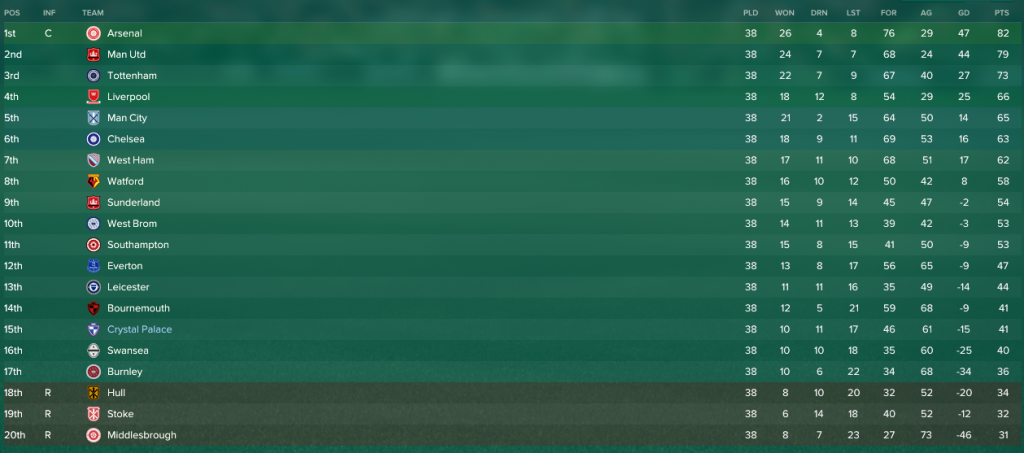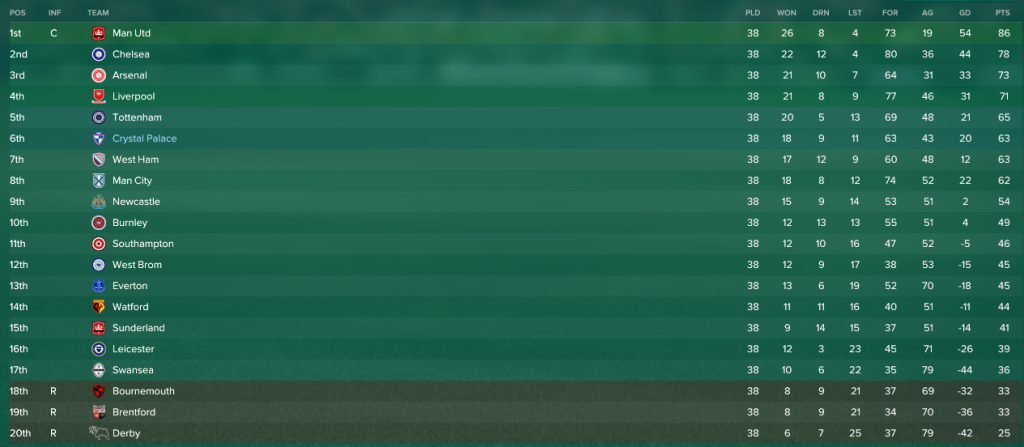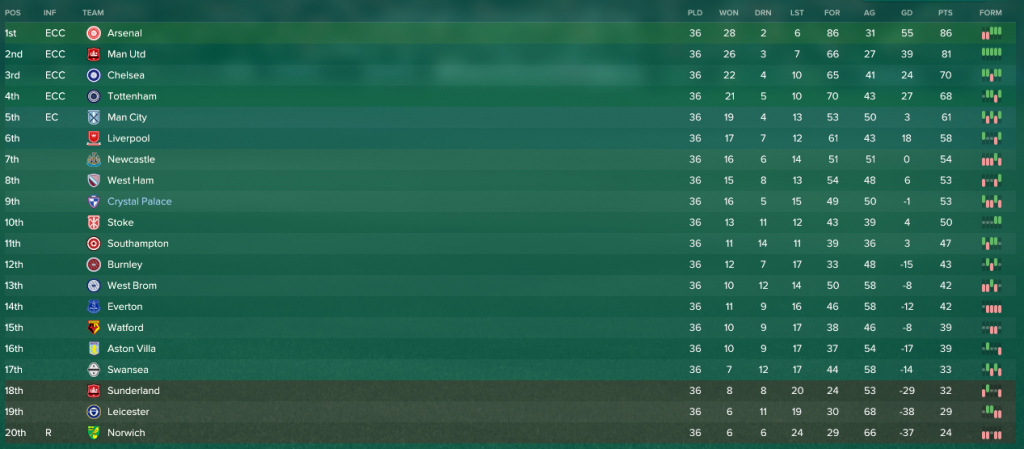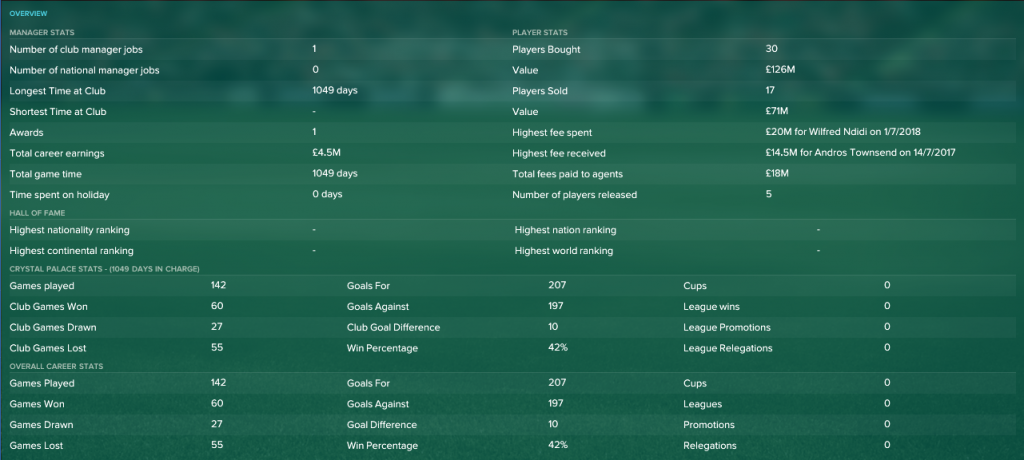After months of talking about it on the Deep Lying Podcast, my time at Crystal Palace has finally come to an end.
I’ve taken the team from a relegation threatened bunch of mediocrities to Premier League solidity and two cup semi finals. I bought in a bunch of talented youngsters – including Kasper Dolberg, Franck Kessie and Charlie Taylor – that the team can be based around for years and I’ve left the club in a better place than when I’ve started.
Of course, it would have been nice to continue. I turned down a contract from the board in the autumn of the third season and never received another one. And while I know I could have added another version of me to the game and carried on, I decided to do what I thought my in game character would do and take an ambitious job abroad to further my career.
Still, despite departing for the bright lights of Hoffenheim, there’s been plenty to look back on. So here’s my summary of my three seasons in charge of Crystal Palace which have, to be fair, been some of the most enjoyable I’ve had in the recent version of Football Manager.
2016/2017: the season of struggle

The first full season at the Palace helm was easily the most difficult. Aside from a reasonable run to the quarter-finals of the FA Cup, it was principally a season of struggle.
Initially, it didn’t feel as if it was going to pan out that way. In the first half of the season, our robust 4-2-3-1 – which saw us taking advantage of targetmen Christian Benteke and Connor Wickham – helped us to a respectable 23 points by the half way point of the season.
An indifferent festive period followed by an abject January, however, plunged us into the mire. It was only the decision to sign Cheick Tiote and Darren Gibson to strengthen in the centre that saved us, with our decision to play a brand of thoroughly dull defensive football hauling us out of the relegation mix.
In the end, we finished the season in 15th position on 41 points with a goal difference of minus 15. It wasn’t pretty and I certainly needed to improve ahead of the second season.
Player of the season: Wilfried Zaha was one of the only players to emerge from the dumpster fire of the 2016/2017 season with credit in his favour. 8 goals and 8 assists from the right wing made him both my highest goal scorer and my best creator. Yes, it really was that bad.
2017/2018: Into Europe we go

In comparison to the first season, the second full campaign in charge was absolutely fabulous fun. A dramatic last minute win against Southampton on the final day of the season saw us into 6th place, taking us into the Europa League in the following season.
There were a couple of reasons for the success. The main one was the quality of my transfer business. In a scarcely believable state of affairs, I managed to get Kasper Dolberg, Franck Kessie, Max Kruse and Phil Jones into the side for under £40m combined. Each of them played a big role in either stabilising the defence or helping us going forward, immeasurably improving our output.
However, the second reason – my decision to go to a 4-3-3-0 strikerless system – worked beautifully in the second half of the season. While we finished a respectable 8th in the first half of the season, our form in the second half of the season made us the 5th best team in the land – beating the likes of Spurs, Liverpool and Manchester United along the way.
We were, admittedly, dreadful in the cups. We were knocked out in the second round of the EFL Cup and the fourth round of the FA Cup. However, walking away from the season with a 6th place finish, a European spot and the Manager of the Year award meant that I didn’t care too much.
Player of the season: Max Kruse. In his first season in English football, Kruse scored 20 and assisted 8 in the league from the AMC strata. He was named Footballer of the Year too, suggesting that he didn’t exactly struggle to set in.
2018/2019: a stuttering conclusion
 I left Crystal Palace with two games of the season remaining to take over at Hoffenheim. While I definitely didn’t have as bad a season as I did in the first year, the 2018/2019 season was probably my most frustrating in charge of the club.
I left Crystal Palace with two games of the season remaining to take over at Hoffenheim. While I definitely didn’t have as bad a season as I did in the first year, the 2018/2019 season was probably my most frustrating in charge of the club.
The reason was our inconsistency. We regularly went from the sublime to the ridiculous, with occasional embarrassing 5-0 defeats at the likes of Liverpool followed by us spanking someone like Burnley 5-1. A combination of injuries to key players (particularly Kruse, who missed most of the season), a glut of games due to the arrival of European football and tactical inconsistency – I never settled on a system for the year – held us down from achieving what we could have done.
In the end, I left Palace in 9th place on 53 points with games against Arsenal and Chelsea yet to play. But I also took them deeper than ever into cup competitions. We beat Manchester City on the way to the EFL Cup semi finals, where we finally fell against Manchester United. Later in the season, we reached the same stage of the Europa League – eventually falling to AC Milan having beaten Ajax, Villarreal and Roma in the knockout stages on the way.
Ultimately, the season was solid if unspectacular. I was therefore hoping to have another summer to strengthen and attack the league without the pressure of European football hanging over us.
However, the failure of the board to offer me a decent contract meant this felt like a perfect stepping off point. And with the Europa League semis done, it was the right time to move on to a new adventure in Germany.
Player of the season: Charlie Taylor. Taylor had been one of my best players since I signed him in season one, but his creative output in season three was outstanding. When I departed the club in 2018/2019, he had already recorded a club record 13 assists from the left full back position.
Other awards
That’s it in terms of how we performed over the three seasons. But to send things off properly, I’ve also got a handful of awards that I’d like to give out to celebrate some of the highlights (and a lowlight) of my time in charge.
Best player: Max Kruse. Due to injury and constrained finances, the German shadow striker played for a little under a third of the time I was in charge at Palace. However, his influence was enormous. His performances in the second season fired us into Europe and helped us play the best football of the save. Thank you, Virtual Max.
Best signing: Franck Kessie. There are a couple of reasons why Kessie edged out Kruse to the best signing award.
First, I felt he was even better value than Kruse was. Although the German cost a shade over £6m, getting a 21 year old Kessie from a freshly relegated Atalanta for £11m was daylight robbery. Second, and related to that, it felt like a robbery is that Kessie was so good. When he played, we won. When he didn’t, we struggled. He is a near perfect blend of physicality, defensive fortitude and creativity – making him a perfect target for anyone still firing up new FM17 saves at this time of the year.
Best performance: A 4-0 home win against Spurs, April 2018. It was a toss up between this and a 5-2 win against Liverpool, but this just about edged it out. The combination of a clean sheet, total domination, the strikerless system and four goals for Kruse felt like the perfect summary of us at our second season best. We were playing blistering football and got our just rewards for it.
Worst performance: A 6-1 away defeat at Bournemouth, February 2017. The first season was marred by terrible performances, but this was the worst.
A couple of early goals, a first half sending off and some unfortunate injuries left us at the mercy of Callum Wilson. And considering this felt like a must win game at the time, I genuinely thought a result this bad would lead to us getting relegated. An awful moment and one I hope I won’t have to think about again.
Best goal: Wilfried Zaha vs Swansea, November 2017. We headed to the Liberty Stadium in pretty dire form early in season three following a tough run of games. Despite dominating the game, we couldn’t get the breakthrough in this match to relieve a bit of pressure.
Up stepped Wilfried Zaha to save the day. The winger was loitering on the edge of our penalty area as Swansea swung in a corner. Kortney Hause cleared it to him, setting him off on one hell of a run. Running the length of the pitch, after beating two men, he squared up to the onrushing keeper and dinked it over him to give us the lead. Think of Hatem Ben Arfa’s end to end goal for Newcastle and you get a rough idea of what it was like.
My best XI (4-3-3-0)
Mandanda, Trippier, Dann, Jones, Taylor, N’Didi, Kessie, Cabaye, Zaha, Kruse and Dolberg.
Subs: Kamara, Hause, Evandro, Tiote, Espinoza, Bergwijn and Janssen
My career stats at Palace
